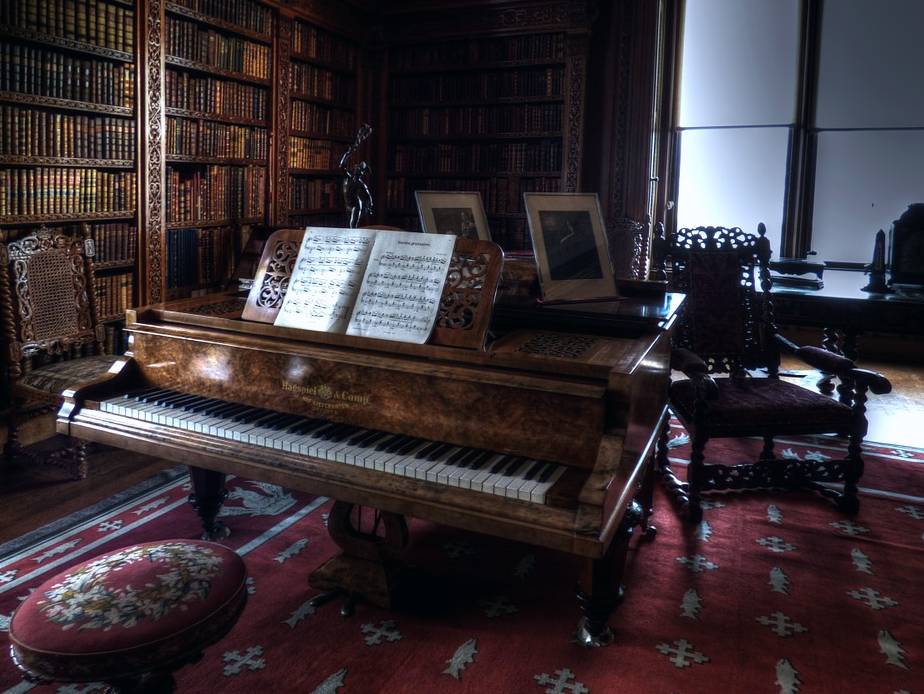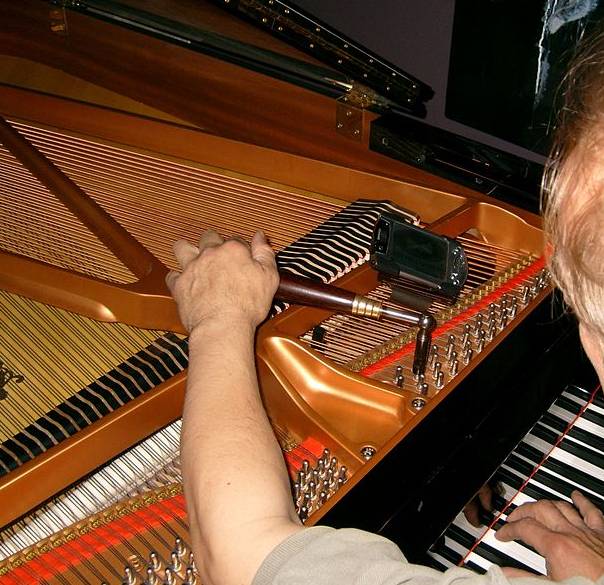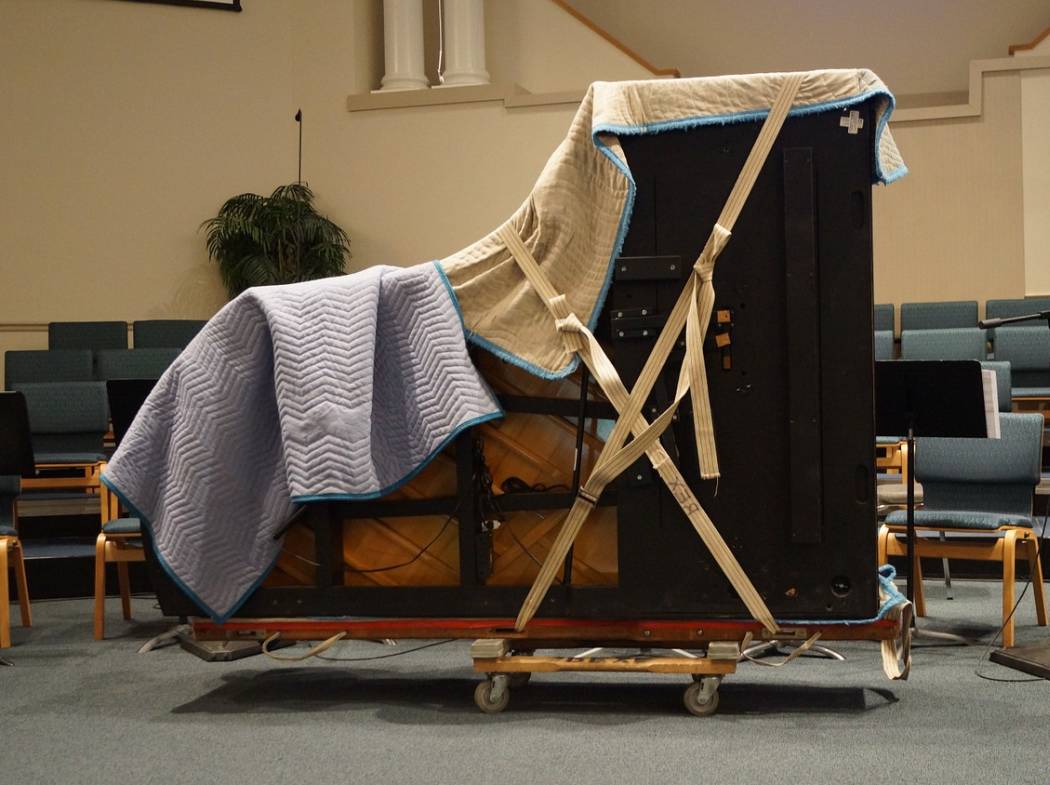So, do you love your piano? Is it a brand new glossy one just beginning its journey – or maybe it’s a pre-loved piano sporting the scars of a few decades of music making? Or it’s a modern electronic piano which you have for gigs and travelling? I’ve had many acoustic pianos in my life, and only one of them brand new. The brand new one was my least favorite. Wood mellows over time and pianos sound better as they age – a bit like wine – as long as they are cared for properly.
Taking care of instrument’s surface
 Let’s start by talking about the outside of your acoustic piano. Is it polished wood? Does it have a lacquer finish, or a polymer finish? If you have bought a second hand piano, you might have to ask your piano tuner what type of finish it has – or you might be able to find the make and model (under the lid of the piano) look it up online and find out that way.
Let’s start by talking about the outside of your acoustic piano. Is it polished wood? Does it have a lacquer finish, or a polymer finish? If you have bought a second hand piano, you might have to ask your piano tuner what type of finish it has – or you might be able to find the make and model (under the lid of the piano) look it up online and find out that way.
If you’ve got solid, polished wood, you can invest in some special wood polish made especially for pianos. One brand is Alice Piano Polish, which is available from Gear4Music. It comes with a special mit which is very gentle. By the way, this polish also works really well for electronic pianos. Little and Lampert (USA) also makes a good piano polish.
An older piano – especially a grand – might be French Polished. French polishing is a very lengthy and specialist skill. There are French Polish specialists around who polish pianos but it comes at a high price. If you are lucky enough to have this type of finish on your piano – it’s a very warm, deep glowing (not high gloss) type of wood finish that results from layer upon layer of hand-applied polish over the course of weeks – then you want to get a professional opinion on how to look after it to preserve it. A regular wipe over with a soft duster will do for daily care, but now and then it might need more TLC, and that’s when you need a professional, at least to advise you, if not actually do it for you.
If you have a piano with a lacquer finish, be sure to use the most gentle cloth you can find to polish it. In fact, have several cloths to hand. First, swipe any dust or dirt off the piano before you use any polish. If you don’t do this, you risk small particles getting caught on the cloth and scratching the surface as you continue to polish. You don’t want to use polish that uses lemon oil or silicone on a lacquer finished piano.
To clean an electronic piano or keyboard, a barely damp cloth will often suffice. You don’t want a cloth that’s too wet – remember it’s electric. I use a feather duster on the keys.
Placing the piano correctly
Now we must talk about the environment that surrounds your piano. Where you place the piano in the room is very important. Personally I believe that the ideal place for your grand piano is library:) The piano looks, sounds, and stays in good condition in the library, because books need similar microclimate as acoustic instrument. But not everyone has library at home, I don’t have one either.

A piano that sits by a window will suffer from bleaching if the sun moves across it day after day. If you have to put your piano by a window, cover it with an attractive throw or scarf of some kind to keep the sun off it. Some people think this is a shame as a piano is such a beautiful piece of furniture, but with the right type of cover, it can enhance the look.
Radiators are not good for pianos. Never place your piano next to or in front of a radiator. The heat will dry out the wood and may cause some glue to weaken, causing all sorts of problems. At the moment, I have a grand piano I had to put right next to a radiator, so I have the radiator permanently turned off and I just wear an extra sweater in the winter. If you have central heating on in your house regularly, look into getting a humidifier of some kind in the piano room. Piano stores and piano tuners know all about these and can recommend some good choices for you.
For long-term storage, or a piano that lives in a public place such as a church or a school, you should invest in a good piano cover. These can be expensive, but not as expensive as fixing damage! Most good piano dealers sell covers that are made to fit their pianos. They are made to measure, heavy, and protect from all kinds of scratches, drink spills and other unfortunate incidents.
Electronic pianos and keyboards are not nearly so sensitive to their surroundings and can be in heated rooms. I just wouldn’t put one right next to a radiator. Electronic instruments often come with a dust cover, or you can buy a more heavy-duty one if you need it.
Tuning the piano

There are 220 strings inside an 88 note acoustic piano and they should be tuned regularly. Every six months is standard, although depending on how much you play your piano, you might need it tuned a bit more, or a bit less. If you don’t think you can hear whether or not your piano is in tune, book the tuner regularly. This is a good way to prevent little problems from becoming big ones down the line. Think of it like going for dental checkups.
When the piano tuner looks at the inside of your piano, he/she will be able to determine if there are any problems that need attention. They might suggest your piano needs regulating. Doing this will make all the keys feel equally balanced under your fingers.
Voicing is another service most piano tuners provide. This adjusts the brightness or mellowness of the sound of your piano. They do this by treating the hammers.
Travelling safely with the piano
If you’re moving house, invest in a proper piano moving expert who is experienced and insured. Grands are turned on their sides and the legs removed. In a way, they are easier to move than uprights. Electronic pianos should be dismantled if they can be, packed in their original boxes, and moved by furniture removal services as normal.

While electronic pianos are unaffected by a move, acoustics tend to get a bit upset after being moved. They have to recover from being turned on their sides and bumped around. Then they have to acclimatize to their new environment, particularly to amount of humidity, heat and sunshine around them. After a move you need to assess the humidity and light falling on your piano and adjust it so that the piano stays happy. Wait about three or four weeks before calling in a tuner.
If you’re travelling, most likely you won’t take your acoustic instrument with you (Although some top concert pianists do actually take their pianos with them around the world!). Electronic pianos travel in strong, well padded keyboard bags specially made for them. Invest in the best you can afford if you’re going to be travelling with it a lot. In fact, even if you’re just taking it to the car and back, it’s really worth having a very good piano case. It’s easy to knock it on a door, wall or even the car. They usually have a side pocket to store midi cables and power cables. If you’re also carrying microphones and other equipment, like keyboard stands, you might want to invest in a separate bag for the accessories. Don’t skimp as they’ll last years and really protect your gear.
Final advice
Finally, protect your acoustic piano from accidents. Have a house rule that drinks are never put on the piano. Fresh flowers look beautiful on a grand, but be aware that this entails having a container of water on the piano! Have a low, sturdy water-tight container that you put your vase inside and place it on an absorbant towel for extra safety. Place it towards the back of the piano so that if it were to be knocked over, it’s as unlikely as possible water will get inside the piano.
When you vacuum around your piano, do so carefully. You don’t want to take chunks out of the legs or sides of the piano with the vacuum cleaner hose. If you have children, teach them to keep their toys and drinks away from the piano.
One last word. If you’ve invested in a beautiful piano – whether acoustic or electronic – invest also in some insurance. It can be very inexpensive and will bring you peace of mind so that you can just enjoy playing your piano and focus on the music.